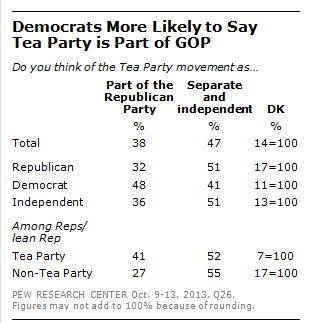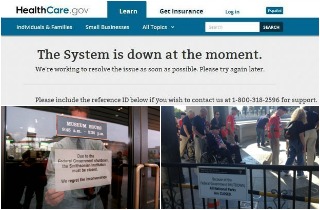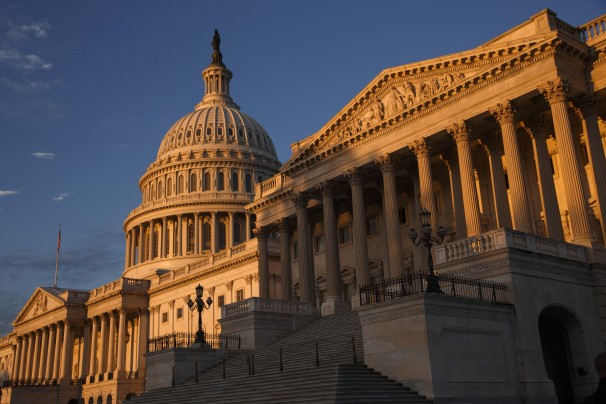The Uncomfortable Truth About the Republican Defeat
Senator Ted Cruz returned to Texas a hero while the senator from two states away, John McCain, called it an “agonizing odyssey …one of the more shameful chapters that I have seen in the years that I have spent here in the Senate”. The split in the Republican Party has grown so wide that a Pew Research poll found that among all Republicans, 51% consider the Tea Party as “separate and independent” (table). So alarmed is the traditional branch of the party that the grapevine says Karl Rove plans to use his SuperPAC to help more moderate Republicans from being “primaried” by Tea Party challengers.
But there was a point that was not specifically made in the relief that greeted the end of the government shutdown and ending of the debt ceiling threat. A quick review:
repeal, defund, delay
Republicans in the House first went through the ritual of passing a bill 
that would keep the government funded and raise the debt ceiling only in return for stripping all funding from Obamacare. That could not get past the Democratically controlled Senate. House Republicans would then have been satisfied if the “individual mandate” — the requirement that everyone above certain income thresholds obtain health insurance — be delayed for a year. That too was beyond consideration by the Senate and the President. It risked the loss of essential income from the young and healthy that insurers need to offset the cost of pre-existing condition applicants who are certain to apply for insurance and whom insurers must now accept.
With the government shut down, House Republicans then resorted to a flurry of small bills that would re-open national parks, the National Institutes of Health, etc. These, too, were rebuffed by a Senate that foresaw a government with only the elements that Conservatives like and which diminished pressure to end the stoppage.
Finally the Senate came up with a small proposal stripped of all of this. With all attempts by essentially the Tea Party to force their will exhausted, House Speaker John Boehner allowed a vote. The agreement funds the federal government through January 15 and lifts the debt limit through February 7. Everything about Obamacare had fallen away except for a requirement that the IRS certify incomes of those applying for subsidies to help them pay for health insurance. The exchange system already accesses the IRS to verify an applicant’s income claims, so nothing was gained.
The bill passed in the Senate 81 to 18 and in the House 285 to 144.
So what was the point that has yet to be made?
It is this: By voting ‘no’ to this bill, 162 members of Congress — all of them Republicans — voted for the United States to default on its debts for the first time in history and in violation of the Constitution’s 14th Amendment.
The warnings of consequences were dire. International Monetary Fund chief Christine Lagarde forecast that damage to world finances would send the world economy into a tailspin. It would “mean massive disruption the world over and we would be tipped again into massive rupture”.
Leaders at the World Bank said much the same.
Credit would again freeze up and there were widespread fears that the default would cause a reprieve of the Great Recession, erasing the gains of the arduously slow recovery.
After the last debt ceiling showdown, the world continued to place its money in U.S. treasuries, but the repeating cycle of dysfunction every time the economy bumps up against the ceiling will ultimately cause countries to invest elsewhere, with our government having to offer ascending interest rates to attract the money it needs to finance spending.
Long term, the worst of all would have been the threat to the dollar as the world’s reserve currency. The debt ceiling debacle had China and Russia resuming their talk of a “basket” of currencies to replace the dollar as the value in which almost all world trade is denominated. What a former president of France, Giscard d’Estaing, resentfully called the “exorbitant privilege” of owning the bedrock currency around which all others fluctuate. That is what the ‘no’ voters tampered with. China’s official state-run news agency called it “perhaps a good time for the befuddled world to start considering building a de-Americanized world”.
calling to account
If you find the vote for default — and that is what it was, that is what would have happened — an irresponsible defamation of the United States, then you might want to make a note of whether your Congress member was on the ‘no’ roster. Here are the lists:
the senate 18:
The first three listed are expected to run for the presidency. The rest are listed alphabetically:
Ted Cruz (Tex.), Marco Rubio (Fla.), Rand Paul (Ky.), Tom Coburn (Okla.), John Cornyn (Tex.), Mike Crapo (Idaho), Mike Enzi (Wyo.), Charles Grassley (Iowa), Dean Heller (Nev.), Ron Johnson (Wis.), Mike Lee (Utah), Jim Risch (Idaho), Pat Roberts (Kan.), Tim Scott (S.C.), Jeff Sessions (Ala.), Richard Shelby (Ala.), Pat Toomey (Pa.), David Vitter (La.).
the house 144:
Alphabetical by name and with state district:
Robert Aderholt AL-4 Robert Latta OH-5
Justin Amash MI-3 Billy Long MO-7
Mark Amodei NV-2 Frank Lucas OK-3
Michele Bachmann MN-6 Blaine Luetkemeyer MO-3
Andy Barr KY-6 Cynthia Lummis WY-1
Joe Barton TX-6 Kenny Marchant TX-24
Kerry Bentivolio MI-11 Tom Marino PA-10
Rob Bishop UT-1 Thomas Massie KY-4
Diane Black TN-6 Michael McCaul TX-10
Marsha Blackburn TN-7 Tom McClintock CA-4
Kevin Brady TX-8 Mark Meadows NC-11
Jim Bridenstine OK-1 Luke Messer IN-6
Mo Brooks AL-5 John Mica FL-7
Paul Broun GA-10 Candice Miller MI-10
Larry Bucshon IN-8 Jeff Miller FL-1
Michael Burgess TX-26 Markwayne Mullin OK-2
John Campbell CA-45 Mick Mulvaney SC-5
John Carter TX-31 Randy Neugebauer TX-19
Bill Cassidy LA-6 Kristi Noem SD-1
Steven Chabot OH-1 Richard Nugent FL-11
Jason Chaffetz UT-3 Alan Nunnelee MS-1
Chris Collins NY-27 Pete Olson TX-22
Doug Collins GA-9 Steven Palazzo MS-4
K. Michael Conaway TX-11 Steve Pearce NM-2
John Culberson TX-7 Scott Perry PA-4
Ron DeSantis FL-6 Tom Petri WI-6
Jeffrey Denham CA-10 Joe Pitts PA-16
Scott DesJarlais TN-4 Ted Poe TX-2
Sean Duffy WI-7 Mike Pompeo KS-4
Jeffrey Duncan SC-3 Bill Posey FL-8
John Duncan Jr. TN-2 Tom Price GA-6
Renee Ellmers NC-2 Trey Radel FL-19
Blake Farenthold TX-27 Tom Reed NY-23
Stephen Fincher TN-8 Jim Renacci OH-16
Chuck Fleischmann TN-3 Tom Rice SC-7
John Fleming LA-4 Martha Roby AL-2
Bill Flores TX-17 Phil Roe TN-1
J. Randy Forbes VA-4 Mike Rogers AL-3
Virginia Foxx NC-5 Dana Rohrabacher CA-48
Trent Franks AZ-8 Todd Rokita IN-4
Scott Garrett NJ-5 Tom Rooney FL-17
Bob Gibbs OH-7 Dennis Ross FL-15
Phil Gingrey GA-11 Keith Rothfus PA-12
Louie Gohmert TX-1 Ed Royce CA-39
Robert Goodlatte VA-6 Paul Ryan WI-1
Paul Gosar AZ-4 Matt Salmon AZ-5
Trey Gowdy SC-4 Mark Sanford SC-1
Kay Granger TX-12 Steve Scalise LA-1
Sam Graves MO-6 David Schweikert AZ-6
Tom Graves GA-14 Austin Scott GA-8
Morgan Griffith VA-9 F. James Sensenbrenner WI-5
Ralph Hall TX-4 Pete Sessions TX-32
Andy Harris MD-1 Jason Smith MO-8
Vicky Hartzler MO-4 Lamar Smith TX-21
Jeb Hensarling TX-5 Steve Southerland FL-2
George Holding NC-13 Chris Stewart UT-2
Richard Hudson NC-8 Steve Stockman TX-36
Tim Huelskamp KS-1 Marlin Stutzman IN-3
Bill Huizenga MI-2 William Thornberry TX-13
Randy Hultgren IL-14 Michael Turner OH-10
Duncan D. Hunter CA-50 Ann Wagner MO-2
Robert Hurt VA-5 Tim Walberg MI-7
Bill Johnson OH-6 Greg Walden OR-2
Sam Johnson TX-3 Jackie Walorski IN-2
Walter B. Jones NC-3 Randy Weber TX-14
Jim Jordan OH-4 Brad Wenstrup OH-2
Steve King IA-4 Lynn Westmoreland GA-3
Jack Kingston GA-1 Roger Williams TX-25
Doug LaMalfa CA-1 Joe Wilson SC-2
Raul Labrador ID-1 Rob Woodall GA-7
Doug Lamborn CO-5 Kevin Yoder KS-3
James Lankford OK-5 Ted Yoho FL-3





